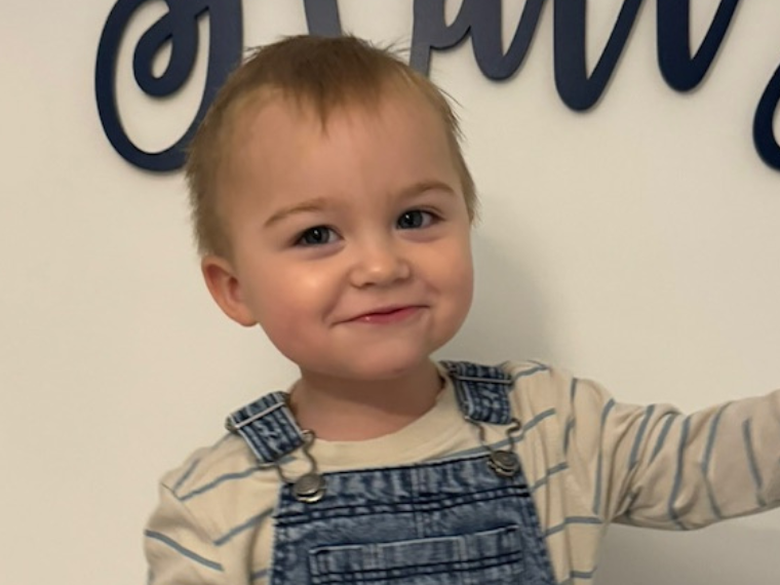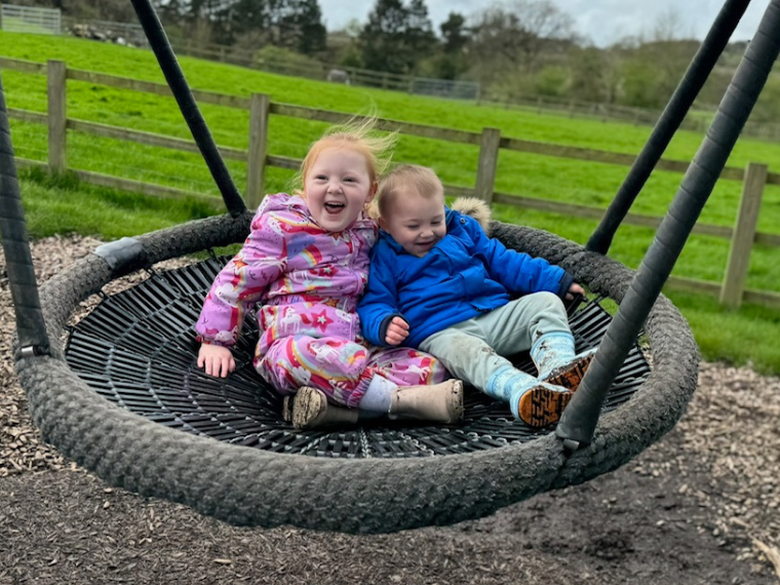5 images
Harry
Harry was diagnosed with Dravet Syndrome at 16 months old. He lives with his mum Beth, Dad Craig and sister Tilly.
Harry had his first seizure when he was just 4 months old, on the evening of his 16 week vaccinations. He was checked over in hospital and they believed he had had a febrile seizure. A few weeks later he had another, again triggered by a temperature. The third time he had one he was 6 months old. He was diagnosed with epilepsy and he began medication (Keppra).
A few months passed and he didn’t have any seizures, however he started to struggle with his balance and would fall sideways when sitting.
Gaining a diagnosis
Then, just after his first birthday, he had 48 hours of seizures. He was admitted to hospital and his consultant was notified. During this stay we discussed Harry’s previous seizures, his balance etc. with the doctor and they recommended him for genetic testing, and mentioned Dravet Syndrome which we had never previously heard of.
Harry had his genetic test, a small blood test, at age 15 months. Myself and my husband also had blood tests to support the genetic testing.
A month later, I received a call from Harry’s consultant who told me that the results of his R14 rapid whole genome sequencing had come back. The tests had identified a pathogenic, de novo, mutation in the SCN1A gene. The consultant told us that Harry has an SCN1A related seizure disorder – Dravet Syndrome. The phone call ended without any offer of support or advice and so we were left to do our own research.
Being told that Harry had Dravet Syndrome changed our lives forever. While the rest of the week was a blur, where I spent hours upon hours researching, trying to find out what Harry’s life was going to be like and what we as a family were likely to expect, having that diagnosis meant that I found Dravet Syndrome UK. We registered straight away.
One of our biggest challenges has been how unknown Dravet Syndrome is. When Harry first received his diagnosis, it was really upsetting and quite triggering to have to explain and describe Dravet Syndrome to family, friends, nursery and most healthcare professionals!
I found it to be such a mix, of wanting the world to know about Harry’s condition so people understand and can try and support you, but then also not wanting to face the reality of Harry’s diagnosis, and subsequently feeling so upset when you have to admit that this life-changing diagnosis is affecting your beautiful child and your family.
Support from Dravet Syndrome UK
Since joining Dravet Syndrome UK I cannot put into words how much the support has benefited us as a family. The wonderful DSUK team being there for us, makes us feel extremely supported.
The Family Guide has been the most helpful resource - I hand it over to healthcare professionals so they can read it, instead of me having to explain it all.
To have contact with families on the private Facebook forum, who are going through what we’re going through has been amazing - it makes us feel less isolated, gives us hope, and it's so beneficial to have access to a wealth of advice and information from lived-experiences!
The Annual Family Weekend Away is a brilliant experience. We feel ‘part of something’ and know we are somewhere where we aren’t in the minority. We can truly relax and enjoy quality family time, with peace of mind that if anything were to happen, medical support is on hand.
The DSUK Conference is also such a useful day, where I felt informed and hopeful after hearing about all the research that is happening. After having so many encounters with professionals who don’t understand Dravet Syndrome, it was amazing to hear from engaging and passionate speakers who are making a big difference!
Facing challenges
We have found it difficult to navigate friends and social situations with children of a similar age. Not only is there a sense of sadness (no matter how hard you try not to) that your child is different and faces challenges other children don’t, but there is also a fear of viruses and illnesses being picked up. To most people, this probably wouldn’t seem a big deal if their child had a cold or cough but for Harry, that could lead to a seizure or even a hospital stay.

It’s difficult to try and balance ‘keeping things normal’ and ‘wrapping up in cotton wool’. It’s especially hard not to beat yourself up when we ‘get it wrong’ and a seizure is triggered because we chose to take Harry to that party.
However, the biggest challenge we have faced is navigating Harry’s diagnosis with his older sister, Tilly. Explaining to a then 3-year-old that her brother was very poorly and mommy had to go and stay at the hospital with him for a while and everything would be okay, when in fact we ourselves didn’t feel in control at all, was heartbreaking and something that even after time, doesn’t get easier. There have been times Tilly has had to be left with family members, or be picked up by friends because of seizures. The guilt you feel as a parent can be overwhelming!
However, what we celebrate each and every day is the amazing superhero sibling Tilly is. She has had to learn and understand things that adults struggle to deal with and we are so in awe of her resilience, compassion and understanding for her little brother. Despite our challenges, Tilly doesn’t see all of that, she just sees her little brother who she loves very much. We make talking about Harry’s seizures normal at home so it’s not frightening for her.
We have however worked closely with her school, who we told about Harry’s diagnosis right from the very start. The Family Guide and Sibling Letter for Schools, that DSUK provided, have been great tools for this. Tilly has 1:1 times with her teachers to discuss her ‘big feelings’ and we are always in contact with them so both sides know how she is coping with the emotional toll this can take. School also support us as parents and have often been there with a hug at the gate when we need it most!
We are very lucky to be supported by a great family and have a brilliant support network. As soon as the seizures started, Harry’s grandparents and family members became familiar with his care plan and how to administer rescue meds, which meant we weren’t on our own without help. Although leaving him is always tough, our family are fantastic in caring for him, so when we do have to pass over control, we know he is in the best hands and cared for like he would be with us!
As parents, we have had to navigate our jobs, meaning we’ve needed to be closer to home and there have been times where plans change at the last minute or things get cancelled at short notice. It’s an adjustment; you can’t just walk out the house without having a ‘what if there is a seizure’ plan in your head, which can make us reluctant to really venture far at times or even commit to plans if Harry isn’t well or seizures have been particularly increased!
A cheeky, happy little boy
Harry’s happiness is infectious - he lights up the room with his comical ways and cheeky personality, and is just wonderful to be around. He loves to dance and wiggle which always keeps us entertained. Harry is a born entertainer and despite everything, he is happy and loves to make others happy. He will do funny things like pull faces or do a silly dance just to make people laugh!
Harry loves playing football and always has a ball near him, getting everyone involved in playing. He absolutely loves his sister and often wants to join in or copy what she is doing!
We are so very lucky to have Harry and although there are some really hard days, he always has that little glint in his eye that even when he isn’t his normal happy self, he gives us all that little bit of happiness we need.

